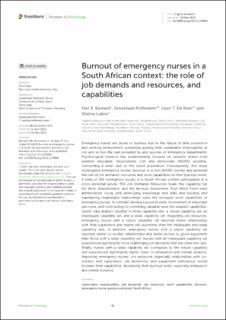| dc.description.abstract | Emergency nurses are prone to burnout due to the nature of their profession and working environment, potentially putting their sustainable employability at risk and so too the care provided by and success of emergency departments. Psychological research has predominantly focused on samples drawn from western, educated, industrialized, rich, and democratic (WEIRD) societies, concerning a small part of the world population. Consequently, this study investigated emergency nurses' burnout in a non-WEIRD society and assessed the role of job demands-resources and work capabilities on their burnout levels. A total of 204 emergency nurses in a South African context participated in a cross-sectional survey. The Job Demands-Resources Scale, the Capability Set for Work Questionnaire, and the Burnout Assessment Tool—Short Form were administered. Using and developing knowledge and skills and building and maintaining meaningful relationships were the strongest work capabilities of emergency nurses. In contrast, earning a good income, involvement in important decisions, and contributing to something valuable were the weakest capabilities. Latent class analysis resulted in three capability sets: a robust capability set, an inadequate capability set, and a weak capability set. Regarding job resources, emergency nurses with a robust capability set reported better relationships with their supervisors and higher job autonomy than the inadequate and weak capability sets. In addition, emergency nurses with a robust capability set reported better co-worker relationships and better access to good equipment than those with a weak capability set. Nurses with an inadequate capability set experienced significantly more challenging job demands than the other two sets. Finally, nurses with a weak capability set (compared to the robust capability set) experienced significantly higher levels of exhaustion and mental distance. Improving emergency nurses' job resources (especially relationships with co-workers and supervisors, job autonomy, and equipment sufficiency) would increase their capabilities, decreasing their burnout levels, especially exhaustion and mental distance. | en_US |

